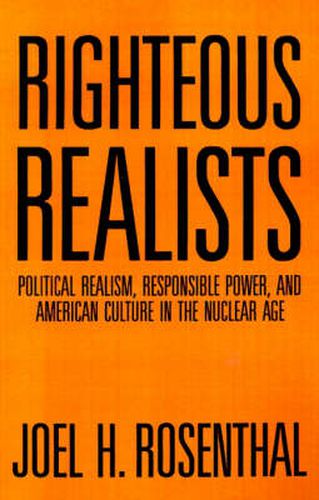Readings Newsletter
Become a Readings Member to make your shopping experience even easier.
Sign in or sign up for free!
You’re not far away from qualifying for FREE standard shipping within Australia
You’ve qualified for FREE standard shipping within Australia
The cart is loading…






This title is printed to order. This book may have been self-published. If so, we cannot guarantee the quality of the content. In the main most books will have gone through the editing process however some may not. We therefore suggest that you be aware of this before ordering this book. If in doubt check either the author or publisher’s details as we are unable to accept any returns unless they are faulty. Please contact us if you have any questions.
Political realism in post-World War II America has not been about power alone, but about reconciling power with moral and ethical considerations. The caricature of realism as an expression of amoral realpolitik has been inadequate and false, for realism in the nuclear age has pivoted as much on moral principles as on power politics. Joel H. Rosenthal’s survey of five noteworthy self-proclaimed political realists explores the realists’ overarching commitment to transforming traditional power politics into a form of
responsible power
commensurate with American values.
Hans Morgenthau, George Kennan, Reinhold Niebuhr, Walter Lippman, and Dean Acheson, the most important and prolific of the American realists, all fought the excesses of crusading moralism while simultaneously promoting a concept of power politics that retained a moral component at its core. This is the story of how architects of containment, present at the creation of the new bipolar world shaped by the threat of
mutual assured destruction,
became ardent critics of that world. It describes realism as a product of a particular time and place, a set of values, assumptions, processes of moral reasoning, and views about America’s role in the world.
Much of the current scholarship on the modern American realists dwells on the alleged inconsistencies of realism as a political theory, and the tortuous mixture of piety and detachment exhibited in the lives of the realists themselves. Rosenthal takes the opposite tack, assembling the ties that bind realism into a coherent world view, rather than deconstructing it into irreconcilable fragments.
Rosenthal maintains that the postwar American realists may be best understood as products of the historical and cultural context from which they emerged. Their attempts to articulate a
public philosophy
and integrate values into decision making in international affairs reflected their views on both the way the world
is
and the way the world
ought to be.
This study explains realism as an effort to articulate a prescriptive framework for working toward the ideal while living in the real. In doing so, it reveals the realists’ insistence on evaluating competing claims and on accepting paradox as an inevitable component of moral choice.
$9.00 standard shipping within Australia
FREE standard shipping within Australia for orders over $100.00
Express & International shipping calculated at checkout
This title is printed to order. This book may have been self-published. If so, we cannot guarantee the quality of the content. In the main most books will have gone through the editing process however some may not. We therefore suggest that you be aware of this before ordering this book. If in doubt check either the author or publisher’s details as we are unable to accept any returns unless they are faulty. Please contact us if you have any questions.
Political realism in post-World War II America has not been about power alone, but about reconciling power with moral and ethical considerations. The caricature of realism as an expression of amoral realpolitik has been inadequate and false, for realism in the nuclear age has pivoted as much on moral principles as on power politics. Joel H. Rosenthal’s survey of five noteworthy self-proclaimed political realists explores the realists’ overarching commitment to transforming traditional power politics into a form of
responsible power
commensurate with American values.
Hans Morgenthau, George Kennan, Reinhold Niebuhr, Walter Lippman, and Dean Acheson, the most important and prolific of the American realists, all fought the excesses of crusading moralism while simultaneously promoting a concept of power politics that retained a moral component at its core. This is the story of how architects of containment, present at the creation of the new bipolar world shaped by the threat of
mutual assured destruction,
became ardent critics of that world. It describes realism as a product of a particular time and place, a set of values, assumptions, processes of moral reasoning, and views about America’s role in the world.
Much of the current scholarship on the modern American realists dwells on the alleged inconsistencies of realism as a political theory, and the tortuous mixture of piety and detachment exhibited in the lives of the realists themselves. Rosenthal takes the opposite tack, assembling the ties that bind realism into a coherent world view, rather than deconstructing it into irreconcilable fragments.
Rosenthal maintains that the postwar American realists may be best understood as products of the historical and cultural context from which they emerged. Their attempts to articulate a
public philosophy
and integrate values into decision making in international affairs reflected their views on both the way the world
is
and the way the world
ought to be.
This study explains realism as an effort to articulate a prescriptive framework for working toward the ideal while living in the real. In doing so, it reveals the realists’ insistence on evaluating competing claims and on accepting paradox as an inevitable component of moral choice.